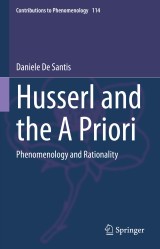Details

Husserl and the A Priori
Phenomenology and RationalityContributions To Phenomenology, Band 114
|
CHF 142.00 |
|
| Verlag: | Springer |
| Format: | |
| Veröffentl.: | 09.06.2021 |
| ISBN/EAN: | 9783030695286 |
| Sprache: | englisch |
Dieses eBook enthält ein Wasserzeichen.
Beschreibungen
<p>This book presents a systematic discussion of the development of Husserl’s concept of the a priori from his early and through his later writings. The chapters contained herein analyze the different phases and aspects of Husserl’s phenomenology of the a priori in light of his twofold notion of reason, construed as both ontological and transcendental. </p>
<p>Starting from the assessment of the introduction of the notion of a priori knowledge in the context of the <i>Logical Investigations</i>, this text uniquely explores its development during the Göttingen years. It is at this time during his work on <i>The</i> <i>Crisis of European Sciences</i>, that Husserl comes to see the a priori as a criterion to interpret the history of philosophy, notably, modern philosophy. This book sheds light upon such concepts as: essence and <i>eidos</i>; ideation, eidetic attitude and eidetic reduction; as well as formal and material, innate and contingent a priori. The author argues that the a priori becomes for Husserl the expression of an ontological form of rationality, i.e., the rationality immanent to being. This book appeals to students and researchers working on Husserl and phenomenology. </p>
<p>Starting from the assessment of the introduction of the notion of a priori knowledge in the context of the <i>Logical Investigations</i>, this text uniquely explores its development during the Göttingen years. It is at this time during his work on <i>The</i> <i>Crisis of European Sciences</i>, that Husserl comes to see the a priori as a criterion to interpret the history of philosophy, notably, modern philosophy. This book sheds light upon such concepts as: essence and <i>eidos</i>; ideation, eidetic attitude and eidetic reduction; as well as formal and material, innate and contingent a priori. The author argues that the a priori becomes for Husserl the expression of an ontological form of rationality, i.e., the rationality immanent to being. This book appeals to students and researchers working on Husserl and phenomenology. </p>
<div>Part I. Introduction: Phaenomenologia Iuxta Propria Principia.- Part II. Husserl on Psychologism and the A Priori.- Chapter 1. Metaphysical Hypostatization.- Chapter 2. A Question of Truth.- Part III. Husserl on the Notion of A Priori before The Eidos.- Chapter 3. On the Way to the Eidos.- Chapter 4. The Doctrine of Ideality and the A Priori in the Logical Investigations.- Chapter 5. Essence, Idea, and the A Priori after the Logical Investigations.- Part IV. On How to Apprehend the Ideal: Three Different Stages.- Chapter 6. Ideation, Attitude, Reduction.- Part V. Essence, Pure Essence, Eidos. The Doctrine of the A Priori in Ideas I.- Chapter 7. Essence and Eidos.- Chapter 8. The Function of Eidetic Sciences.- Chapter 9. Τόδε τὶ, Individuum, Region.- Part VI. Adventures and Misadventures of the Rationalität.- Chapter 10. Rationalization.- Chapter 11. The Conflict Between Different Forms of Rationality.- Part VII. Formal and Material, Innate and Contingent A Priori.- Chapter 12. Formal and Material, Analytic and Synthetic A Priori.- Chapter 13. From Formal to Innate—From Material to Contingent: The Development of the Concept of A Priori in Light of the Genetic Perspective.- Part VIII. Conclusion (Notes for Future Research).- Index.</div><div><br></div>
<p>Daniele De Santis is an Assistant Professor at the Department of Philosophy and Religious Studies (ÚFAR) of Charles University, Prague. He has published extensively on 20th century phenomenology, with a special focus on Husserl and the Göttingen circle. His interests cover a wide array of different areas, including Plato and the history of Platonism, Kant and transcendental philosophy, as well as Derrida and the tradition of French phenomenology. He is the author of Derrida tra le fenomenologie: 1953-1967. La differenza e il trascendentale (2018); Di Idee ed essenze. Un dibattito su fenomenologia e ontologia (1921-1930) (2014). He is also the co-editor of Edmund Husserl between Platonism and Aristotelianism (2018).</p>
<p>This book presents a systematic discussion of the development of Husserl’s concept of the a priori from his early and through his later writings. The chapters contained herein analyze the different phases and aspects of Husserl’s phenomenology of the a priori in light of his twofold notion of reason, construed as both ontological and transcendental.</p><p>Starting from the assessment of the introduction of the notion of a priori knowledge in the context of the <i>Logical Investigations</i>, this text uniquely explores its development during the Göttingen years. It is at this time during his work on <i>The</i> <i>Crisis of European Sciences</i>, that Husserl comes to see the a priori as a criterion to interpret the history of philosophy, notably, modern philosophy. This book sheds light upon such concepts as: essence and <i>eidos</i>; ideation, eidetic attitude and eidetic reduction; as well as formal and material, innate and contingent a priori. The authorargues that the a priori becomes for Husserl the expression of an ontological form of rationality, i.e., the rationality immanent to being. This book appeals to students and researchers working on Husserl and phenomenology.</p>
Covers the development of Husserl’s concept of the a priori in a systematic way Uniquely lays out the foundation for a systematic understanding of Husserl’s concept of reason in both its transcendental and ontological form Focuses on the relation between the concepts of a priori and reason within Husserl’s phenomenology
Diese Produkte könnten Sie auch interessieren:

Karl Schuhmann, Selected papers on phenomenology

von: Karl Schuhmann, Cees Leijenhorst, Piet Steenbakkers

CHF 177.00















